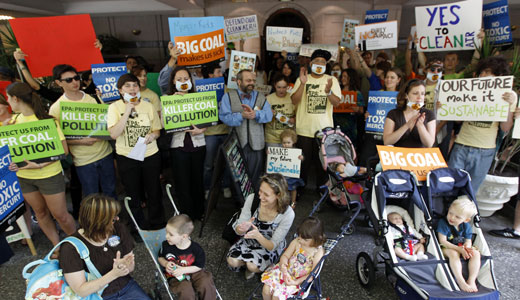
The Democrat-dominated Senate defeated a move June 20 by Republicans to crush EPA regulations on mercury and toxic chemical emissions from coal power plants. The measure, which the GOP claimed would create jobs, failed 53 to 46. Coal power critics say if deregulated, the pollution from these plants would threaten health and endanger lives.
The attempt to slash the regulations was sponsored by global warming denier Sen. James M. Inhofe, R-Okla.
The EPA’s move to control mercury and chemical output was deemed necessary by the agency in 2000. It was in 2011, however, that the Obama administration approved enhanced regulatory measures, after a court threw out an attempt by the Bush administration to exempt power plants from such monitoring.
The recent concern about the pollution could be linked to a recent study by the Environmental Integrity Project – a nonprofit research and media outreach group, known for placing anti-environment laws and policies under scrutiny. The study concluded that the overall health cost of coal plant pollution greatly outweighed the energy benefits it provided. Dr. Jonathan Levy of the Boston University School of Public Health, with whom the EIP collaborated, found that emissions from the dirtiest coal plants had contributed to between 2,700 and 5,700 deaths in 2011 alone.
The EIP looked at government data on air pollution from coal plants, and were able to use atmospheric dispersion models to estimate its general spread and impact on people.
Next, they calculated the number of people widely impacted by the pollution with a peer-reviewed analysis. They concluded that the cost in human life from the emissions was greater than the value of the electricity produced by the 51 plants that were part of the study.
Power plants are currently the largest remaining source of man-made mercury in the environment; mercury is known to impair brain development in children.
Environmental groups and activists have praised the regulations as a historic step forward in terms of health and environmental conscientiousness.
Another significant point is that humans are not the only ones at risk to these emissions. Yellowstone National Park – and the wildlife that makes its home there – faces the danger of being polluted by the nearby dirty Colstrip coal plant in Montana. Even with reduced mercury output, the park would still face the threat of soot and haze pollution.
Sen. John D. Rockefeller IV, D-W.Va., disputed claims by Inhofe that this was an attack on the coal industry. Rather, said Rockefeller, the rules would simply help to clean up the coal industry.
Mine workers, meanwhile, have been showing legitimate concern for the preservation of their own jobs. The United Mine Workers union is staying neutral so far in the 2012 presidential race, which may stem from fears that pollution curbing will result in job downsizing.
While a delicate issue, Rockefeller believed this was not the case; that the rules would give the coal industry a viable future, in which even coal workers would not only maintain their own jobs, but would see their own health protected.
The EPA estimates the regulations will reduce mercury emissions by 90 percent, and acid gases by 88 percent.
In an attempt to push the shutdown of these regulations, Inhofe brought the move under the Congressional Review Act, which gives lawmakers the authority to block major regulations. Republicans failed, however, to launch what was in all probability a profit-driven attack on people’s health.
Photo: Demonstrators rally in support of EPA regulations on toxic air pollution from power plants. (Matt Rourke/AP)

MOST POPULAR TODAY


Zionist organizations leading campaign to stop ceasefire resolutions in D.C. area

Communist Karol Cariola elected president of Chile’s legislature

Afghanistan’s socialist years: The promising future killed off by U.S. imperialism

High Court essentially bans demonstrations, freedom of assembly in Deep South






Comments